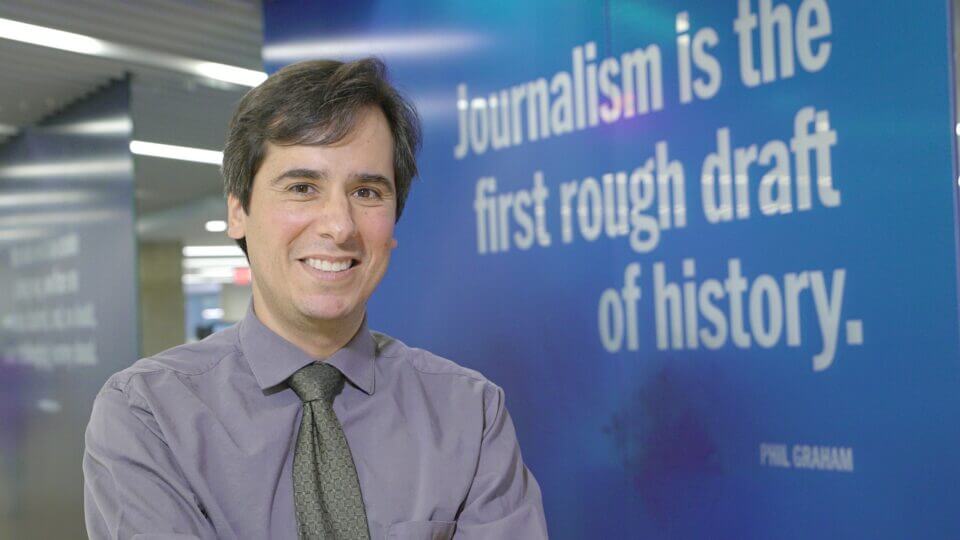
“Lozada’s book provides a comprehensive, incisive analysis of the intellectual debates that defined the Trump-era. As we plunge forward into a post-Trump presidency politics, it is a must read.”
Maya Angelou, the late poet and civil rights activist, and Donald Trump, the New York real estate developer and reality television star turned President, are not two names that often find their way into the same sentence. But as I read Carlos Lozada’s recent book, What Were We Thinking: A Brief Intellectual History of the Trump Era, I was constantly reminded of an Angelou quotation: “You can’t really know where you are going until you know where you have been.”
As President Trump nears his Oval Office exit on January 20th, we are slowly coming to grips with a post-Trump politics—or, at the least, a less Trump-centric politics. Even if President Trump creates his own news network or proactively remains in the public eye, his hold over the American mind will surely weaken when deprived of his presidential bully pulpit. That said, President Trump will still exert considerable sway over American politics, either directly or indirectly, for years to come.
Thus, it is essential for those of us hoping to construct a more workable and healthier American politics to come to grips with President Trump’s impact on our polity thus far, especially how he has affected the thought leaders who drive our conversations regarding ideas, policies, and history. To get a sense of where the intellectual currents and tides of political energy might be trending, we must understand where they have been in the era of President Trump. We cannot do so without reading What Were We Thinking.
A Pulitzer Prize-winning nonfiction book critic for the Washington Post, Lozada is an incredibly gifted writer. In What Were We Thinking, he weaves together roughly 150 Trump-era books “to preserve a snapshot of how we grappled with the Trump-era in real time.” Some of these works are very much centered on President Trump the man or the inner workings of his White House, while others are less hyper-focused on President Trump and more attuned to the broader questions to which his presidency has given rise: questions of immigration, national identity and inclusion, #MeToo-style feminism, democratic norms, pervasive social alienation, and the very nature of the American experiment, both past and present.
Trump and the White Working Class: A Complex Relationship
Lozada highlights how many of these Trump-era books exhibit the sort of thinking that helped give rise to President Trump in the first place—books rife with reductionist thinking and binaries. For example, he takes aim at the books that come down on one side or the other of one of the earliest and most discussed debates of the Trump-era: Was the President’s base fueled by economic anxiety or racial resentment? Lozada notes that far too many authors ventured into rural areas and small, deindustrialized towns to answer this question with their partisan preconceptions in tow. Indeed, the same Trump voter in one book can come off quite differently in another. For Salena Zito and Brad Todd, Ed Harry of Luzerne County, Pennsylvania is a folksy, good-natured Trump voter motivated primarily by economic concerns. For Ben Bradlee, Jr., Ed Harry is brimming with culture war-type grievances and conspiracy theories.
Trying to pin down the white working class’s zeal for President Trump on one single factor was always a fool’s errand. As Lozada writes, “the most compelling accounts are those that show how race and class offer reinforcing explanations rather than conflicting ones.” If we are to understand President Trump’s political appeal—particularly what pushed him over the top in the 2016 GOP primaries—and, thus, how his election and presidency will continue to shape our politics going forward, simplistic thinking and monocausal explanations will not do. Neither deindustrialization, job loss, culture wars, nor reactions to demographic change can tell the whole story alone. However, when taken together, these developments and factors begin to paint a picture of communities hollowed out and harboring resentments awaiting to be primed.
Trump-Era Identity Politics: Necessary Corrective or Dangerous Development?
Lozada critiques many of the white working class books for lacking in such nuance, but this analysis does not carry over into his review of Trump-era books centered around identity politics. Such manifestos, memoirs, and academic studies are often derided—and often correctly derided—as sacrificing individuality at the altar of a particular group characteristic (race, gender, sexual orientation, etc.). Indeed, as Lozada points out, many of the most biting critics of identity politics are traditional liberals like Bari Weiss, Francis Fukuyama, and Columbia University’s Mark Lilla. They worry that identity politics divvies up the nation into smaller and smaller subsets, straining our sense of shared citizenship and neglecting the unique dignity and individuality of each citizen.
Lozada counters such critiques in a rather compelling—but not entirely satisfying—manner. He writes: “Underlying many of these [identity politics-centered] books, even those arguing most stridently and effectively for group rights and representation, is an almost desperate affirmation of individuality.” Lozada wants readers to treat identity politics as a necessary, intermediate step towards the fulfillment of America’s liberal democratic promise—as “not an obstacle to an encompassing national vision” but, rather, “an obligatory and painful step toward its fulfillment” in light of our nation’s troubled history of identity-based oppression and exclusion.
This is a persuasive argument, but in lifting up books like Ibram X. Kendi’s How to Be an Antiracist as necessary cries for individual dignity and recognition cloaked in the language of group, Lozada fails to acknowledge just how contrary some of these authors’ arguments run to certain basic precepts of liberal democracy. Even if they are supposedly motivated by the long thwarted desire for individual recognition in the first place, some of these books quite explicitly reject concepts like individual agency and human complexity. They opt for religion-like pieties and group-centered binaries. No matter the legitimacy of the underlying impetus for such thought, this is worrisome.
Thus, like so much else in the Trump-era, the issue of identity politics has not been resolved so much as it has sprung forward into the public consciousness—begging tough questions that likely will not be answered for quite some time.
Yes, such grievances are very much understandable, and we all must grapple with them. However, when such arguments devolve into binary thinking and calls for laws and constitutional amendments attesting to group rights, we would be remiss to view those calls as acceptable steps towards the fulfillment of our liberal democratic promise. Rather, we should confront them for what they are: perhaps well-intentioned, but fundamentally flawed and illiberal correctives spawned by painful, long festering hurts.
Thus, like so much else in the Trump-era, the issue of identity politics has not been resolved so much as it has sprung forward into the public consciousness—begging tough questions that likely will not be answered for quite some time. So it goes for the debates that bubbled up on the political right during the Trump years, as well.
The Post-Trump Right: More Questions Than Answers
In the wake of President Trump’s defeat, right-leaning think pieces are proliferating with regards to the future of American politics, conservatism, and the Republican Party especially. Do the 2020 election returns constitute the dawn of a new multi-ethnic working class Republican Party, as Oren Cass and Christopher Caldwell are claiming? Or is the notion that Republican voters are yearning for economic nationalism somewhat fanciful and detached from the available data, as Scott Lincicome writes at The Dispatch?
The fault lines being generated by these intra-conservatism debates seem to be running in parallel with those set down by President Trump himself, as Lozada expertly outlines in What We Were Thinking. Lozada separates three main currents of right-wing political thought in the era of Trump: the sycophants, the Never Trumpers, and the pro-Trump intellectuals. Reading Lozada is essential to get a grip on where the post-Trump debates on the Right may turn.
The pro-Trump intellectuals, it seems, will continue apace with their ongoing project of attempting to draw out a coherent ideology (“Trumpism,” for short) from the actions and whims of an exceptionally incoherent and unmoored man. This is the source of the talk of the GOP as a multi-ethnic workers party. That President Trump improved his electoral performance among non-whites is a welcome occurrence from the standpoint of the health of our democracy (nobody should want a racially polarized politics) but especially from the vantage point of pro-Trump intellectuals. Lozada notes that the attempts by writers such as National Review’s Rich Lowry and others to construct a unifying, nationalist political program out of Trumpism was always somewhat of a shoddy enterprise. Nationalism is a quest for unity, which is not the word that springs to mind when one thinks of our 45th president. Lozada puts it best:
“The irony of intellectualizing Trump’s nationalism is that, despite what the president may say about nationalism in rallies or interviews, he appears to care little for the American nation as a whole; he governs with only his base and himself in mind. Not even during a global pandemic, a crisis ruthlessly indifferent to red or blue, can this president stop dividing, excluding, keeping score, and even turning health versus economic recovery into a culture-war standoff—all while placing his own grievances at the center of the story.”
With the diversification of the GOP electorate, Trump-inspired calls for national unity ring less hollow. Whether a politician like Senator Josh Hawley—buoyed by these pro-Trump intellectuals—can hold together President Trump’s base and continue to expand and diversify it in the years to come is an open question. At the least, it could lend some coherence and credence to the nationalist intellectual project that the Trump presidency helped spawn.
How the Never Trumpers conduct themselves will be the most interesting question for post-Trump conservatism. Will they revert to pre-Trump orthodoxies, and if not, how will Trump have affected them going forward? Lozada writes that “Only with the rise of Trump did [Never Trumpers] think to interrogate the conservative dogma they’d long defended.” The upshot of those interrogations remains unclear. And, as for the sycophants, well, they have yet to begin constructing their post-Trump presidency intellectual posture. They are too busy defending the President’s indefensible charges of systemic voter fraud in court and in the public square.
Trump’s America: A Blip in Time
Lozada’s book provides a comprehensive, incisive analysis of the intellectual debates that defined the Trump-era. As we plunge forward into a post-Trump presidency politics, it is a must read. What Were We Thinking not only enables readers to better come to grips with the central debates that have defined the Trump-era, but it also underscores how unsettled so much of our politics still is. If President Trump was anything, he was a disruptor—a disruptor not only of political norms and of the city of Washington, D.C. but of our intellectual life, as well. Confronting the Trump presidency has laid bare divisions and disputes that have long been lurking beneath the surface of what seemed to be staid coalitions, intellectual and partisan alike.
What Were We Thinking should inspire readers as we move our politics forward. Much is unsettled, and thus opportunities abound to forge new consensuses and build novel coalitions. As Lozada remarks while reflecting on the Trump-era histories from the likes of Jon Meacham and Jill Lepore, “the American experiment is not just worth the fight, it is synonymous with it.” We have had many fights in the Trump-era. It seems that a good many more are in store. With the help of books like Lozada’s, we can be better prepared for such fights, imbued with a sense of where we are headed having grappled with where we have been.
Thomas Koenig is a recent graduate of Princeton University and will be attending Harvard Law School in the fall of 2021. He can be found on Twitter @TomsTakes98










